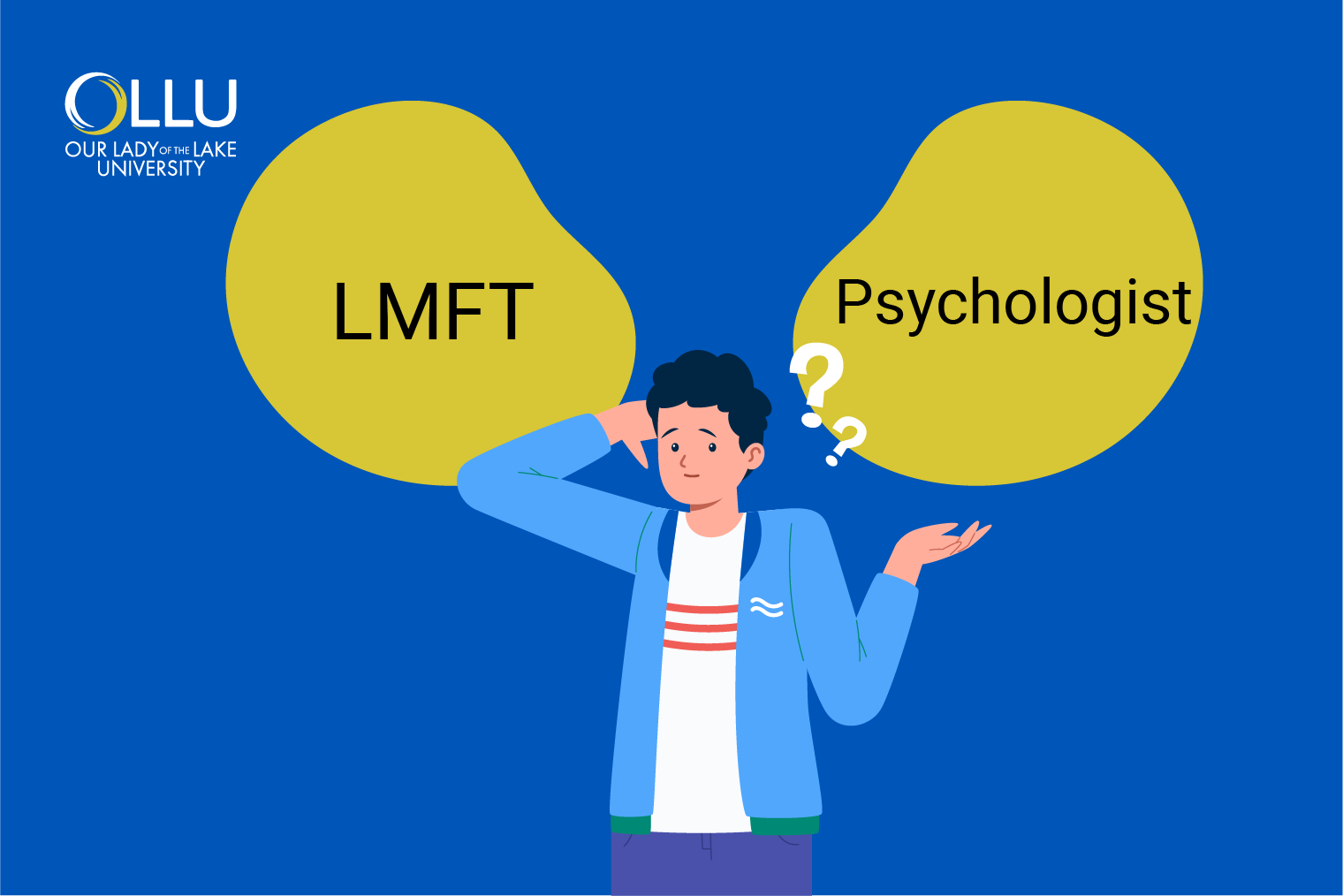LMFT vs. Psychologist: Understanding the Differences
Dec 02, 2023

As the scientific study of the body and mind, psychology aims to explore various aspects of human interactions. Marriage and Family Therapy (MFT), on the other hand, is a specified field of psychology catered toward resolving marital and family challenges using a systemic and holistic approach.
If you're looking to choose between embarking on an LMFT vs. psychologist career, you must realize their requirements and standouts. So, keep reading to learn more!
What Is an LMFT?
LMFT stands for Licensed Marriage and Family Therapist. An LMFT is a qualified professional who specializes in aiding individuals, couples, groups, and families to resolve their emotional, psychological, and relational conflicts by guiding them toward a reconciliation path. LMFTs hold a master’s or doctoral degree, specifically in marriage and family therapy or a related field. In addition, they have completed the necessary training and experience to obtain licensure.
What Is a Psychologist?
A psychologist is an educated professional who studies and practices psychology. Psychologists typically conduct assessments and diagnoses combined with prior research on human behavior to make an informed decision about how to approach patients. To help the patient, they usually provide psychotherapy or counseling services where they discuss the root/cause of a problem to promote psychological stability.
Education And Training
The education and training paths for LMFTs and psychologists differ, each reflecting the distinct professional roles and targeted areas. Here is what you need to know.
LMFT
Becoming a licensed marriage and family therapist requires specific educational requirements. Common steps include:
- Earning a bachelor's degree in psychology, counseling, social work, or a related field
- Pursuing a master's degree in Marriage and Family Therapy (MFT) or a closely related field
- Accumulating supervised clinical experience through internships or practicum placements under the supervision of a licensed professional
- Applying for and obtaining state licensure
Psychologist
Becoming a psychologist typically involves the following educational steps:
- Earning a bachelor's degree in psychology or a closely related field
- Gaining relevant experience through internships, research opportunities, or volunteer work in psychology or related fields
- Pursuing a master's degree (optional)
- Earning a doctoral degree, such as a Ph.D. (Doctor of Philosophy) or
- Psy.D. (Doctor of Psychology)
- Choose a specialty, such as clinical psychology, counseling psychology, school psychology, industrial-organizational psychology, and more.
- Complete internship and supervised experience
- Obtain state licensure
Licensing and Regulations
Aspiring practitioners of MFT or psychology should fulfill all the requirements to obtain licensure.
LMFT
To become licensed in the field, in addition to education and training, an MFT is required to:
- Complete a certain number of supervised clinical hours, varying by state.
- Pass a state-recognized licensing examination. In the United States, the most prominent exam used for licensure is the National Marriage and Family Therapy Examination (MFT Exam).
- Apply for licensure to the state licensing board. The application should typically include transcripts, documentation of supervised experience, exam results, and other relevant information.
- Submit a criminal background check to ensure compliance with legal and ethical standards. This typically includes a fingerprint check.
- Some states require individuals to pass a jurisprudence exam to assess their knowledge of laws and regulations related to the practice of family and massage therapy.
- And finally, LMFTs are required to maintain licensure. This means continuing to engage in educational courses and new experiences to develop their professional capacities further.
Psychologist
Psychologists are required to complete similar steps. Those include:
- Completing a supervised postdoctoral internship or residency to achieve the required clinical hours.
- Passing the standardized Examination for Professional Practice in Psychology (EPPP), administered by the Association of State and Provincial Psychology Boards (ASPPB).
- Applying for licensure to the state licensing board. The applicant should provide transcripts, documentation of supervised experience, exam results, and other relevant information.
- Undergoing a criminal background check.
- In some states, aspiring professionals are required to pass a jurisprudence exam on laws and regulations about the practice of psychology.
- Finally, psychologists are expected to maintain licensure by engaging in education courses and renewed experiences.
Scope of Practice
Another way in which LMFTs and psychologists differ is their scope of practice.
LMFT
An LMFT is specifically trained to assess, diagnose, and treat individuals, couples, and families experiencing a wide range of emotional, mental health, and relational challenges. These professionals approach mental issues from a systemic perspective, diving deeper into the impact of family dynamics, relations, and other systems on an individual's mental health. They use various assessment tools, interviews, and observations to understand patient concerns. Such assessment and diagnosis lead to applying individual, couple, and family therapy and developing a treatment plan tailored to their specific needs.
LMFTs sometimes collaborate with other qualified professionals–psychiatrists, social workers, and psychologists—to provide comprehensive patient care.
Psychologist
The scope of practice for a psychologist is broad because it incorporates the study, assessment, and diagnosis of various mental health and behavioral issues.
As assessment and diagnosis are crucial to understanding the underlying conditions, emotional disorders, and cognitive issues, psychologists use interviews to gain insight and observations. Using evidence-based therapeutic approaches, they provide psychotherapy or counseling services to enhance a patient’s overall well-being.
Many psychologists also work in academic settings, teaching psychology-related courses to university students. Some may provide consultation services to offer their expertise to organizations, schools, businesses, and other institutions.
Focus of Treatment
We will now discover the specific issues that LMFTs and psychologists specialize in.
LMFT
Licensed marriage and family therapists are experts who work on various cases under different circumstances and develop personalized treatment plans based on their patient's needs. Their focus of treatment may include:
- Relationship and family dynamics – analyzing how such dynamics influence an individual's mental health
- Communication skills – including working with patients to improve communication within relationships
- Conflict resolution – helping couples or family members resolve conflicts within their relationship
- Cultural sensitivity – analyzing the impact of cultural factors on family dynamics and individual well-being
- Life transitions – assisting individuals in navigating various life transitions, such as marriage, divorce, childbirth, adolescence, and loss
- Parenting challenges – addressing parenting styles, discipline strategies, and managing family transitions
Psychologist
The approach and focus of psychologists' treatment varies based on their specialization, patients' needs, and specific techniques employed. These professionals provide:
- Individual psychotherapy – discussing individually with a patient to help overcome issues like anxiety, depression, trauma, grief, self-esteem, etc.
- Couples and family counseling – helping them improve communication, resolve conflicts, and strengthen their relationships
- Behavioral therapy – aiding patients in modifying their behaviors in an attempt to resolve behavioral issues such as phobia, compulsions, or impulsiveness
- Career counseling – assisting individuals in understanding their career goals and finding their way toward success.
- Trauma-informed therapy – helping patients overcome their traumas and address their psychological impact
Work Settings

A demanding career such as that of an LMFT or psychologist calls for unwavering commitment. Here is where these occupations might take you.
LMFT
Licensed marriage and family therapists are exposed to various working environments, including:
- Mental health centers – providing their expertise to individuals and families within the community
- Hospitals – providing integrated care to patients in collaboration with medical staff and professionals
- Private settings – working with individuals, groups, or families in private
- Educational institutions – working with students to help them cope with family-related issues of various natures
- Correctional facilities – assisting individuals and families involved with the criminal justice system
- Nonprofit organizations – working with NGOs catered toward mitigating issues like domestic violence, trauma, etc.
Psychologist
A psychologist's expertise is required in the following work settings:
- Academic institutions – providing clinical supervision and counseling to students and faculty
- Hospitals – aiding patients in overcoming physical health issues and providing psychological assessments in collaboration with the staff
- Research institutions – conducting research and studies to help understand the nature of human behavior and mental processes
- Private setting – offering a more intimate therapy to individuals, couples, or groups
- Military and veterans services – addressing the underlying mental health issues and struggles of service members, veterans, and their families.
Financial Considerations
Both LMFTs and psychologists enjoy high-paying careers. The estimated average salary for a licensed marriage and family therapist is $80,558 per year; the additional pay, which might include a cash bonus, commission, tips, and profit sharing, is $4,395 per year. This leads to an annual total pay of $84,953 for LMFTs.
Psychologists, on the other hand, have an estimated average salary of $99,010 per year; the additional pay is $7,691 per year. This translates to an estimated $106,702 total pay annually for a psychologist.
Future Outlook
Understanding the importance of LMFTs and psychologists in fostering a positive environment has led to an increased demand in the job market.
The difference in job outlook from 2022 to 2023 for LMFTs is a staggering 15% . On average, about 5,900 openings for marriage and family therapists are projected to emerge annually over the decade. This need results from the number of retirees and those who transfer to different occupations.
On the other hand, the employment rate for psychologists is expected to grow by 6% , resulting in about 12,800 job openings per year over the decade.
LMFT vs. Psychologist: Which One Should I Choose?
If you're passionate about resolving marital conflicts and other relationship issues within families, then the marriage and family therapist profession might be a good fit for you. You will have the option of choosing a flexible schedule, although the schedule might be more rigid in public institutions.
On the other hand, if you are more inclined towards clinical work than general counseling, then you should consider becoming a psychologist. As a psychologist, you would be responsible for studying, assessing, and diagnosing human behavior working closely with patients. It's important to note, however, that psychologists generally earn a higher annual total pay than LMFTs.
Ultimately, the choice between becoming a marriage and family therapist or a psychologist depends heavily on your interests and the impact you wish to make.
The Bottom Line
LMFTs and psychologists present two distinct roles within the field of mental health. While they have their differences, both positions benefit from numerous job opportunities available and lucrative salaries.
If you're interested in a career as an LMFT or a psychologist, start by exploring our programs, including our Master of Science in Psychology with a concentration in School Psychology and Master of Science degree in Psychology with a concentration in Marriage and Family Therapy (MFT) . Take the first step toward success with Our Lady of The Lake University today!
Frequently Asked Questions (FAQs)
Is an LMFT a psychologist?
Marriage and Family Therapy is a specialized field in the realm of psychology. All psychologists are therapists, but not all therapists are psychologists.
What is a marriage and family therapist?
A Marriage and Family Therapist (MFT) specializes in helping individuals, couples, and families resolve conflicts and foster understanding.
What do marriage and family therapists do?
Marriage and Family Therapists (MFTs) conduct diagnosis and provide counseling to help patients overcome their marriage and family struggles.
What is the difference between a therapist and a psychologist?
While a therapist provides counseling and support, a psychologist diagnoses mental health disorders, conducts psychological assessments, and provides therapy.
Should I see a therapist or psychologist?
If you're dealing with everyday stress, relationship challenges, or specific behavioral issues, you should consult with a therapist. You should see a psychologist if you require psychological assessments or a formal diagnosis for your mental health concerns.